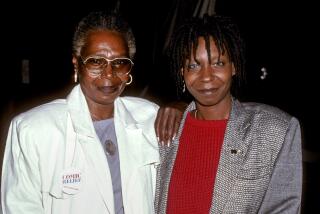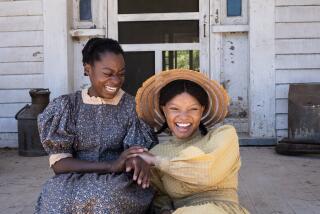Ex-U.S. Justice and U.N. Envoy Goldberg Dies
- Share via
WASHINGTON — Arthur J. Goldberg, who served as a Supreme Court justice, ambassador to the United Nations and secretary of labor, died at his home here Friday. He was 81.
The press office of the Supreme Court announced that Goldberg, a member of the court from 1962 to 1965, was found dead in the apartment where he had lived alone since the death of his wife, Dorothy, in 1988.
His physician, Michael Newman, said Goldberg died of coronary artery disease.
Burial will take place in Arlington National Cemetery, the court announcement said. No date was set.
Goldberg resigned from the court when President Lyndon B. Johnson asked him to become the U.S. representative to the world organization. Later, this became a bitter point of contention between the two men. Johnson’s memoirs, published in 1971, describing Goldberg as “bored” by his work on the bench, drew a sharp rejoinder.
“The Supreme Court was the culmination of a life’s ambitions,” Goldberg told an interviewer at the time, saying that he left his judicial post with the greatest reluctance only at Johnson’s urging. He filled the U.N. vacancy resulting from the death of Adlai E. Stevenson.
Commentators said that Johnson’s real motive was to vacate a seat for an old friend, Abe Fortas, who replaced Goldberg in 1965. Ironically, Fortas was forced to resign in 1969 under public pressure over a stipend he had received from a foundation.
Goldberg later said Johnson had wanted him to depart because of his strong opposition to the Vietnam War. Barbara Goldberg Cramer, a social worker and his only daughter, in a telephone interview from her Chicago home, said the family had been torn by Johnson’s request.
“We all felt he shouldn’t have made that decision,” she said, “but he felt it was the best thing to do for the nation. His thinking was, when the President asks you to do something, you respond positively.”
Cramer said she was shocked by how much her father had aged after his departure from the court.
“Sometime in 1967, I went looking for him on the floor of the United Nations,” she said. “I couldn’t find him, couldn’t recognize him, because his hair was so white. “
Of his defeat for the governorship of New York in 1970, she said, “he took the loss in stride--he could deal with defeat as well as victory.”
On the court, Goldberg was a key member of the court’s dominant liberal wing during those three years of the Earl Warren era. Goldberg was distinguished as the co-author of a 1965 landmark opinion striking down a Connecticut ban on birth control devices, declaring a right of individual privacy that laid the foundation for the later Roe vs. Wade decision legalizing abortion.
As United Nations ambassador, he was a vigorous advocate of Mideast peace and unavailingly utilized his negotiating skills to bring agreement on the issue. He also championed disarmament and after he left the post in 1968 wrote a series of articles in which he backed the admission of China to the world organization and urged the United States to take a harder line against South Africa.
Justice William J. Brennan, who served with Goldberg, praised his former colleague’s role in the unification of the American Federation of Labor and the Congress of Industrial Organizations. Goldberg was the principal legal expert in the formation of the single organization in 1955 and remained a special chief counsel until he was named secretary of labor by President John F. Kennedy in 1961.
“Few had more admirers and loyal friends,” Brennan said in a statement. “He was very human, a man of dignity and courtly bearing, punctilious, courteous, cultivated, a superb host . . . . We, his former colleagues, shall miss him greatly.”
Justice Byron R. White, the only other member of the court who had also served with Goldberg, hailed him as a “great public servant” and added:
“He did an awful lot to improve the conditions both of workers and management.”
Former Chief Justice Warren E. Burger recalled arguing a case against Goldberg three days after arriving in Washington in 1953 as a young assistant attorney general.
“We have been warm friends since then. He was an outstanding lawyer and spokesman for organized labor,” Burger said. “He was a balanced and thoughtful jurist.”
Lane Kirkland, president of the AFL-CIO, echoed White’s praise of Goldberg’s service to labor.
“Few people in history have served the country with greater dedication to the concerns of working men and women and greater devotion to the public interest,” Kirkland said in a statement. “For more than a decade, the trade union movement had the extraordinary benefit of his advice and counsel on a wide variety of matters. While serving as general counsel of the CIO (1948-53) and the United Steelworkers of America (1948-61), Justice Goldberg played a major role in the consummation of the AFL-CIO merger, and we are indebted to him for his important work toward the success of that crucial endeavor.”
After leaving his U.N. post in 1968, Goldberg joined the New York law firm of Paul, Weiss, Goldberg, Rifkind, Wharton & Garrison. He continued his outspoken opposition to the Vietnam War and, in 1970, ran unsuccessfully as the Democratic candidate for governor against Nelson A. Rockefeller.
He was a member of numerous presidential commissions and in 1978 was awarded the Medal of Freedom by President Jimmy Carter. He was the 14th president of the American Jewish Committee, elected in 1968.
Goldberg was born in Chicago and was graduated from Northwestern University in 1929, receiving his law degree summa cum laude in 1930. Married to the former Dorothy Kargans in 1931, he was the father of two children. His son, Robert M. Goldberg, is an attorney in Anchorage, Alaska.
During World War II, Goldberg served in Army intelligence in Europe. His son said he worked with the Office of Strategic Services, forerunner of the CIA, to establish a network of labor activists in occupied countries and Palestine that spied on the Nazis.
“He ran spy rings all over Europe and the Middle East,” Robert M. Goldberg said in a telephone interview. “He was critical in the operations of the OSS.”
Goldberg was also instrumental in persuading labor leaders to endorse John F. Kennedy’s candidacy for the presidency, his son said, and later became an activist labor secretary under Kennedy, often traveling around the country to settle labor disputes.
Robert Goldberg said his father’s greatest achievement at the U.N. occurred in 1967, when he helped write Resolution 242, providing an outline for the peaceful settlement of the Israeli-Palestinean conflict that still has heavy currency today.
More to Read
The biggest entertainment stories
Get our big stories about Hollywood, film, television, music, arts, culture and more right in your inbox as soon as they publish.
You may occasionally receive promotional content from the Los Angeles Times.










